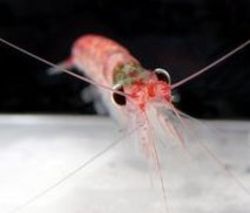NEWS

PEKRIS
The Performance of Krill vs. Salps to withstand in a warming Southern Ocean (PEKRIS)
Project description
PEKRIS is complementary project to POSER – Population Shift and Ecosystem Response – Krill vs. Salps. While POSER concentrates on the biogeochemical fluxes in the Southern Ocean, POSER focusses on the organismic level of krill vs. salps. Antarctic krill (Euphausia superba) plays a central role in the Antarctic food chain. Top predators such as penguins, seals and whales directly or indirectly depend on high krill stocks. Krill fishery is the biggest fishery of crustaceans worldwide with over 230,000 t per year (State 2013, FAO). Long-term data sets indicate a drastic decline of the krill populations in the Southern Ocean since the mid 70s. While krill stocks are sinking, rising abundances of gelatinous organisms (jellyfish and salps) have been noted in the Southern Ocean as well as worldwide. In the past years, a significant increase of salps (Salpa thompsoni) has been noticed in Antarctica. Continuous warming and the accompanied shifts of sea ice cover have been correlated to decreasing krill stocks and increasing salp populations. This correlation, however, is not concluding on a circumpolar scale as salps also increase in areas where so far, no warming trend was observed. The goal of PEKRIS on one hand is to quantify the physiological and genetic traits of krill vs. salps supporting potential adaptation to temperature rise. On the other hand, PEKRIS aims to study the thermal windows of both species in order to predict ensuring optimal functions of physiological processes in their life cycle in accordance to different climate change scenarios by using individual-based models on both species.
Project Leader and Contact
Prof. Dr. Bettina Meyer
Participants
Prof. Dr. Bettina Meyer (AWI/ICBM)
Prof. Dr. Uta Berger (Technische Universität Dresden)
Working groups ICBM
Biodiversity and biological processes in polar Oceans
Cooperation
International:
Prof. Dr. Rodolfo Costa, University of Padua, Padua, Italy
Prof. Dr. Evgeny Pakhomov (UBC), Canada
Dr. Peter Tiselius, Sven Lovén Centre for Marine Sciences, Kristineberg, Sweden
Dr. So Kawaguchi, Australian Antarctic Division, Kingston, Tasmania
Prof. Dr. Loyd Peck, British Antarctic Survey, Cambridge, UK
Duration
2016-2019
Financial Support
German Ministry of Education and Research (BMBF)
The project and the financial support is located at the University of Oldenburg

![[Translate to English:]](/f/5/_processed_/3/2/csm_ICBM-Logo-transparent-_91fe1c6774.png)